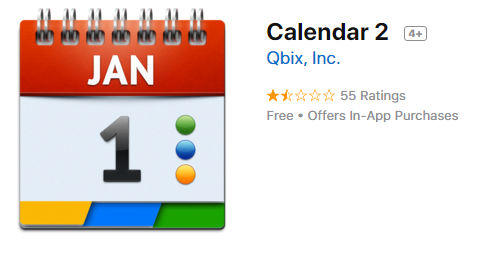| Fear And Loathing In The App Store 20 - Apple Stops Crypto Currency Mining App |
| Written by Mike James | |||
| Friday, 16 March 2018 | |||
|
This is another very odd story that can be spun either way to suit your point of view. What could possibly be wrong with Apple removing an app that mines cryptocurrency? Read on to find out...
Calendar 2 is a popular app and like most app developers the owners wanted to make some income to fund their work. So the company produced a free version and a premium version that you had to pay real money to unlock. Then they had a bright idea. Users don't like ads as a way of funding apps but what about getting them to donate a small chunck of their processing power. All Advanced Features for Free A clever idea, but with the bad press, rightly so, that malware mining has been getting, the idea of any app mining cryptocurrency on a user's machine has a taint. It wasn't long before news items and social media started to have comments like "An app mines cryptocurrency and Apple don't seem to mind". This was odd because the general mood seemed to be that Apple wasn't doing its job and Calendar needed to be thrown out of the App Store. What do you think at this point? You could think it was a clever idea and if Apple is fine with it let's get on and add some cryptocurrency-mining code. Alternatively you could think that the user wasn't informed sufficiently of what cryptocurrency mining was all about to make a decision. Dumb users need to be protected and who better than Apple to do the enforcing of the rules. This is where things get complicated and water gets muddy. It turns out that there was a bug in the mining code, which caused it to use more than the 10 to 20% cpu power that the app was supposed to use. It basically hogged the CPU for as long as the phone was on. Users, of course, weren't happy and Qbix, the company responsible for Calendar weren't either. Then Apple pulled Calendar from the App Store because it violated guideline 2.4.2 "Design your app to use power efficiently. Apps should not drain battery, generate excessive heat, or put unnecessary strain on device resources." So did Apple remove the app because it mined cryptocurrency or because it mined cryptocurrency badly?
It looks like we aren't going to find out because Qbix removed the mining code and the app is now back in the store with the comment: To our users, including many of you who wrote in to us: Interestingly the company made $2000 of Monero coins in the three days that the app was mining. This suggest mining crytptocurrency is a viable way of funding apps, although you have to remember that this is based on using rather more of the user's CPU time than the 10-20% intended. Some news reports are claiming that Apple have taken a stance on mining apps, but this isn't clear and Apple don't seem keen on making it clear.
More InformationThere’s a currency miner in the Mac App Store, and Apple seems OK with it
Fear and Loathing In The App Store
Epic Games CEO Finally Notices That UWP Apps Are A Walled Garden To be informed about new articles on I Programmer, sign up for our weekly newsletter, subscribe to the RSS feed and follow us on Twitter, Facebook or Linkedin.
Comments
or email your comment to: comments@i-programmer.info |
|||
| Last Updated ( Wednesday, 19 September 2018 ) |



